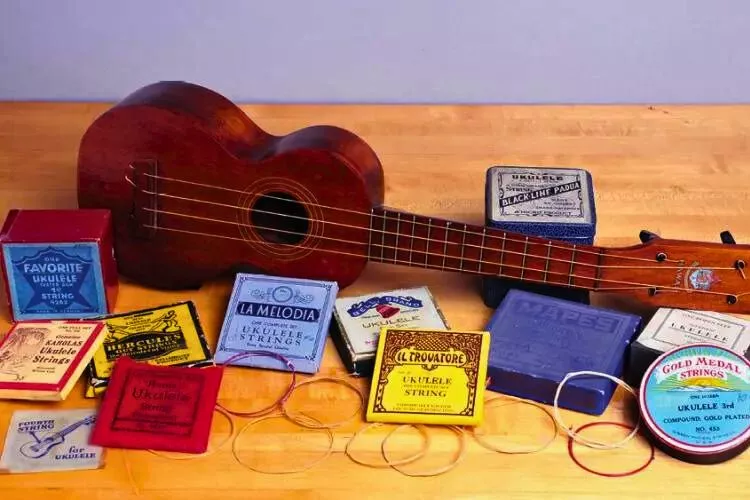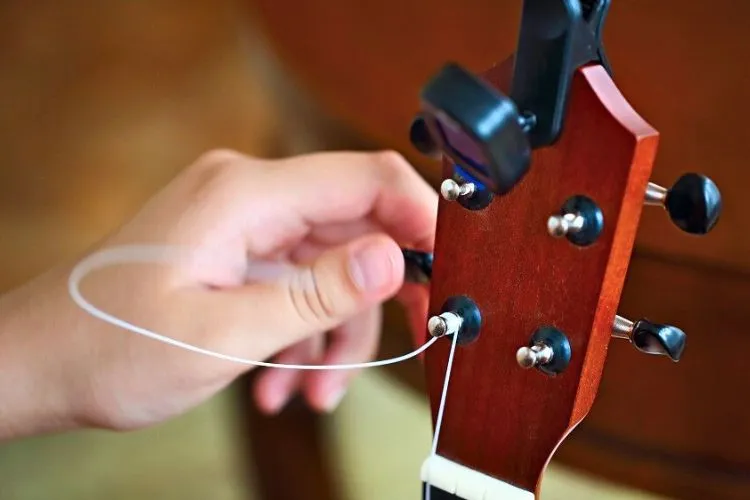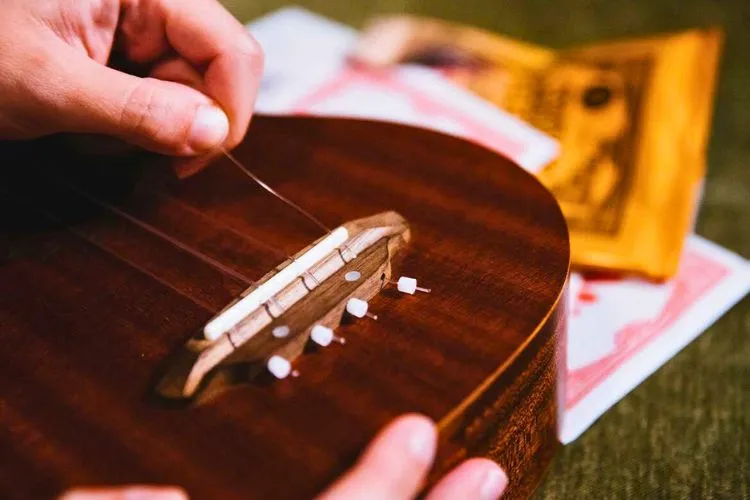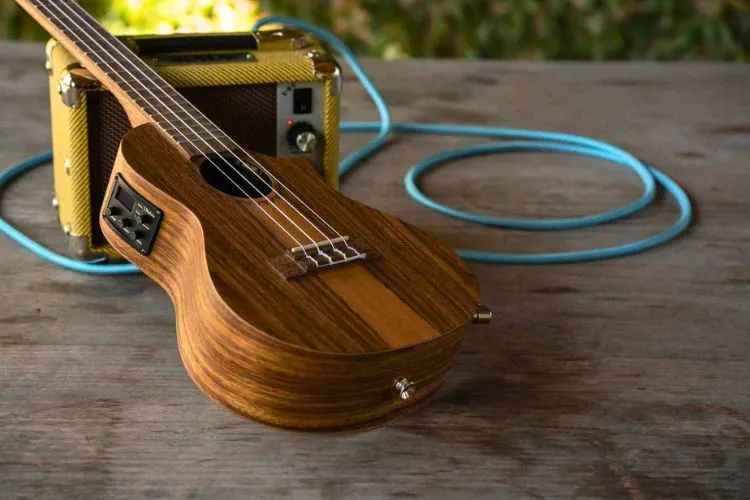When a ukulele’s sweet, lilting tones ring in the air, it’s hard not to stop and listen. These petite instruments pack a distinct, resonant sound that carries an unmistakable air of joy. And at the heart of this sound?
The strings. But have you ever stopped to consider what are ukulele strings made of that gives its uniquely angelic voice?

This article will delve into the intriguing world of ukulele strings. From the materials used to their impact on the sound produced, we’ll explore how synthetic and natural materials combine to create the iconic sound that has made the ukulele beloved worldwide.
Whether you’re a seasoned ukulele player or a curious music lover, join us on this melodic journey.
Contents
🎶What are ukulele strings made of?
Ukulele strings are made from various materials like nylon, fluorocarbon, titanium, steel etc., each with unique properties and characteristics.
In this article, we’ll dive deep into the most commonly used materials for ukulele strings, exploring their nuances, impact on sound, and why some players prefer one type over the others.

A Classic Choice: Nylon Strings
Nylon strings are popular for many ukulele players due to their soft, warm sound. A synthetic material, nylon is known for its smooth feel, low tension, and overall durability.
These strings are more cost-effective and require less-frequent replacement than other materials. However, they can be sensitive to temperature and humidity changes, affecting their tuning stability.
Clear and Bright: Fluorocarbon Strings
Closely related to nylon, fluorocarbon strings offer slightly different characteristics that appeal to many players. These strings are known for their bright and clear tone, producing more sustain than nylon strings.
In addition, fluorocarbons are less affected by temperature and humidity, making them a more stable option for players in varying environments.
The Power of Metal: Titanium Strings
Moving into the realm of metallic strings, titanium offers a unique sound and playing experience for ukulele enthusiasts. Known for their projection and durability, titanium strings provide a clear, warm tone with exceptional sustain.
These strings also have a slightly higher tension than nylon or fluorocarbon strings, resulting in a different feel for players’ fingertips.
Classic with a Twist: Steel Strings
Although not as common for ukuleles, steel strings exist and offer a distinct difference in sound and playing experience.
Often associated with electric ukuleles or resonator-style instruments, steel strings produce a powerful bright sound that can cut through in a mix.
Players should be cautious when considering steel strings for their ukulele, as they can put additional stress on the instrument due to increased tension.
The Best of Both Worlds: Wound Nylon Strings
Wound nylon strings feature a nylon core wrapped with a thin layer of another material, usually a type of metal like silver or copper.
These strings offer a unique combination of warmth from the nylon core and a brighter, more resonant tone from the wound outer layer.
Wound nylon strings are commonly used on the lower-pitched strings of larger ukulele types like baritone or tenor models.
Versatility and Depth: Wound Metal Strings
Wound metal strings could be an appealing option for those ukulele players looking for a more complex and resonant sound. These strings feature a metal core wrapped with another type of metal, such as bronze, phosphor bronze, or even steel.
Wound metal strings offer a greater dynamic range, more sustain, and a depth of tone not commonly found in other string types. Remember that these strings may require more maintenance and care due to their composition.
By understanding the materials used in ukulele strings, you’ll be better equipped to choose the perfect option for your playing style and desired sound.
Whether you prefer the classic warmth of nylon or the versatility of wound metal strings, a world of options is waiting for you to explore.
🎶Are Ukulele Strings Plastic?
Plastic is often used as a layman’s shorthand to describe ukulele strings made from synthetic polymers like nylon or fluorocarbon. Yes, many ukulele strings are made from these materials, but they are not ‘plastic’ in the typical sense.
The word ‘plastic’ is usually associated with everyday materials like the ones used in food packaging or water bottles, which have different properties than those found in ukulele strings.

Nylon and fluorocarbon strings are derived from complex synthetic processes to produce a flexible, durable material that can withstand the tension necessary for a musical string. They also possess the acoustic properties to produce a pleasing, musical tone.
While it may be common to refer to ukulele strings as ‘plastic,’ it’s more precise to say that many ukulele strings are made from certain types of synthetic polymers like nylon or fluorocarbon.
Each of these materials contributes to the characteristic tone and playability of the ukulele.
🎶Can Ukuleles Use Metal Strings?
Ukuleles can be strung with metal strings, which is less common than using nylon or fluorocarbon strings.
Metal strings, such as electric ukuleles or resonator models, are often found on specialty ukuleles, contributing to a brighter and punchy sound.
However, before restringing your ukulele with metal strings, it’s crucial to understand that they exert a higher tension or pulling force on the instrument than nylon or fluorocarbon.

This increased tension can potentially damage a traditional ukulele that was not built to handle it, leading to problems such as bowing the neck or even cracking the body.
Therefore, while it’s possible to use metal strings on a ukulele, they should only be used on instruments specifically designed to accommodate the increased tension.
If you’re considering a switch to metal strings, it’s recommended to seek advice from a qualified luthier or music store professional to ensure your instrument can safely handle the change.
🎶What Strings Are The Same On The Ukulele And Guitar?
Ukuleles and guitars, despite being stringed instruments, are quite different in their construction and tuning. Standard ukuleles typically have four strings, while guitars usually have six. Furthermore, the tuning of these strings differs between the instruments.
However, there is some overlap when it comes to the notes of the strings. On a guitar, the highest four strings – D, G, B, and E – align with the standard tuning of a ukulele: G, C, E, and A, but transpose an octave lower.

In terms of material, guitars and ukuleles use nylon strings, particularly for classical guitars and standard ukuleles.
That said, nylon guitar strings are not interchangeable with ukulele strings because they are designed differently to accommodate each instrument’s size and tension requirements.
Due to tension and construction differences, steel or metal strings used on acoustic and electric guitars are generally not used on standard ukuleles.
In conclusion, while there are some similarities in the materials used and the note range, strings are not directly interchangeable between guitars and ukuleles due to each instrument’s unique construction, tuning, and tension demands.
🎶Can You Use Guitar Strings On A Ukulele?
While guitars and ukuleles are stringed instruments, their strings are not typically interchangeable. This is due to several reasons:
- Size and Tension: Guitar strings are generally longer and thicker than ukulele strings to accommodate a guitar’s larger size and scale length. They are also designed to manage different tension levels. Using guitar strings on a ukulele may result in excessive tension, potentially damaging the ukulele’s neck or bridge.
- Material: While both instruments can use nylon strings, the type of nylon used and how it is constructed differ. Furthermore, many guitars use metal or steel strings, which are typically unsuitable for a standard ukulele, unless specifically designed to handle the increased tension of metal strings.
- Tuning: Ukuleles and guitars are tuned differently. The standard tuning for a ukulele is G-C-E-A, whereas a guitar is typically tuned to E-A-D-G-B-E.
So, while it may be theoretically possible to string a ukulele with guitar strings, it’s not recommended due to these different requirements and the potential risk of damaging the instrument.
Instead, it’s best to use strings designed for the ukulele to match the instrument’s size, tension requirements, and intended sound.
🎶What To Keep In Mind When Choosing Ukulele Strings?
Choosing ukulele strings can greatly impact your instrument’s sound and playability. Before making a selection, consider the following aspects:

- Ukulele Size/Type: Ensure you choose strings matching your ukulele’s size and type. Soprano, Concert, Tenor, and Baritone ukuleles each have different scale lengths and tensions for which the strings need to be designed.
- String Material: Strings made from different materials produce different tones. Nylon and fluorocarbon strings are most common, offering a warm and bright tone. Other options include metal, titanium, and various types of wound strings. The right material can depend on the sound you’re going for and the ukulele you’re playing.
- String Gauge: The thickness of the string can influence both the sound and the feel. A thicker gauge usually means more volume and sustain, but might be harder to press down. Conversely, a thinner string might be easier to play but less rich in sound.
- Your Playing Style: Different styles and genres of music may demand different types of strings. If you’re a strummer, softer nylon strings could work best. You might prefer harder and thinner strings for their brighter sound if you’re a picker.
- Environment: Environmental factors like temperature and humidity affect string durability and sound. Certain materials, like fluorocarbon, are less sensitive to these changes compared to others, like nylon.
- Budget: String prices vary depending on the brand and the material used. Higher-end strings may offer better sound and last longer, but ultimately, you should choose something that fits within your financial means.
🎶Frequently Asked Questions (FAQs)
Ukulele strings are most commonly made from nylon or fluorocarbon. However, some types of ukuleles, like resonator or electric models, can use steel strings.
Most ukulele strings are made from plastic called nylon. However, they can also be made from other materials such as fluorocarbon, another type of plastic, or even metal in certain cases.
Yes, ukulele strings can break, although it’s not a common occurrence. Factors such as excessive tension, wear and tear over time, or even a sharp edge on your ukulele’s bridge or nut can lead to a string breaking.
The 4 strings of a standard ukulele are typically made out of nylon or fluorocarbon. Depending on the type and size of the ukulele, these strings will be tuned differently. For instance, with a standard soprano ukulele (most common type), the strings from top to bottom are G, C, E, and A.
Here’s an additional 300 words to add before the conclusion of your article:
🎶 How to Care for Your Ukulele Strings
Taking proper care of your ukulele strings can significantly extend their lifespan and maintain the quality of your instrument’s sound. Here are a few tips for string care:
Clean Your Strings Regularly
After playing your ukulele, wipe down the strings with a clean, soft cloth. This removes oils, sweat, and dirt that can accumulate on the strings and cause wear or corrosion over time.
For fluorocarbon or nylon strings, this simple practice can help maintain their tone and longevity.
Avoid Excessive Tension
Be cautious not to over-tighten your strings when tuning. Excessive tension can weaken the strings, making them more prone to breakage.
Additionally, it may place undue stress on the ukulele’s neck and bridge, potentially causing damage.
Replace Strings Periodically
Even with proper care, ukulele strings will eventually wear out and lose their tonal quality. As a general rule, consider replacing strings every six months to a year, depending on how frequently you play.
If you notice a dull or muted sound, fraying, or difficulty maintaining tuning, it’s likely time for a new set of strings.
Store Your Ukulele Properly
The environment in which your ukulele is stored can impact the longevity of the strings.
Avoid exposing your instrument to extreme temperatures, high humidity, or direct sunlight, as these conditions can degrade the strings over time. Consider using a ukulele case to protect both the instrument and its strings.
Consider Your Playing Style
Your playing technique also affects string wear. Heavy strumming or aggressive picking may cause strings to wear out faster.
If this is your style, you might want to opt for more durable strings like fluorocarbon or titanium.
By maintaining your ukulele strings with care and attention, you can ensure that your instrument continues to produce its signature sweet tones while remaining in optimal playing condition.
Conclusion:
Ukulele strings can be crafted from various materials; each contributing distinctively to the sound and playability of the instrument.
The most common materials are nylon and fluorocarbon, favored for their durability, tension and tonal characteristics. Some ukuleles may also use metal or wound strings for a unique auditory effect.
Players must understand these string materials’ implications on their playing style, musical genre and overall performance.
From resonating warm tones with nylon strings, vibrant and bright notes using fluorocarbon, to robust volumes with metal or wound strings; a ukulele’s string composition unequivocally shapes its acoustic personality.
Experimenting and discerning personal preference can journey you towards the sound that resonates the sweetest, enhancing your ukulele playing experience.
